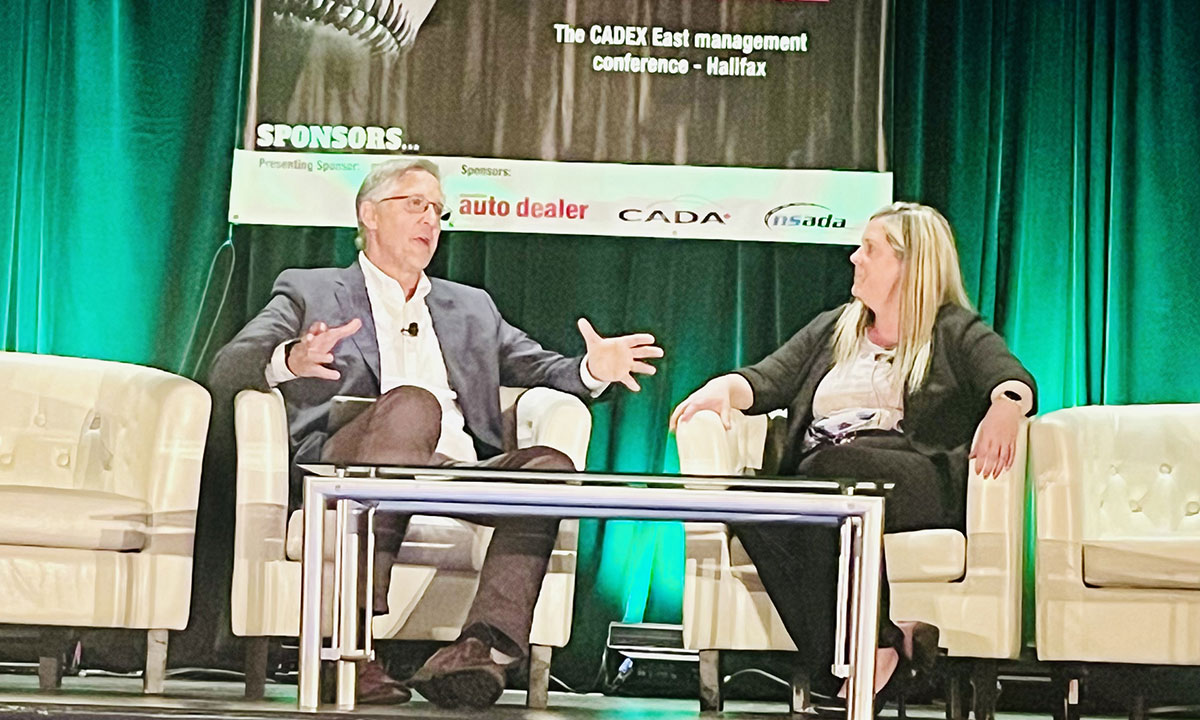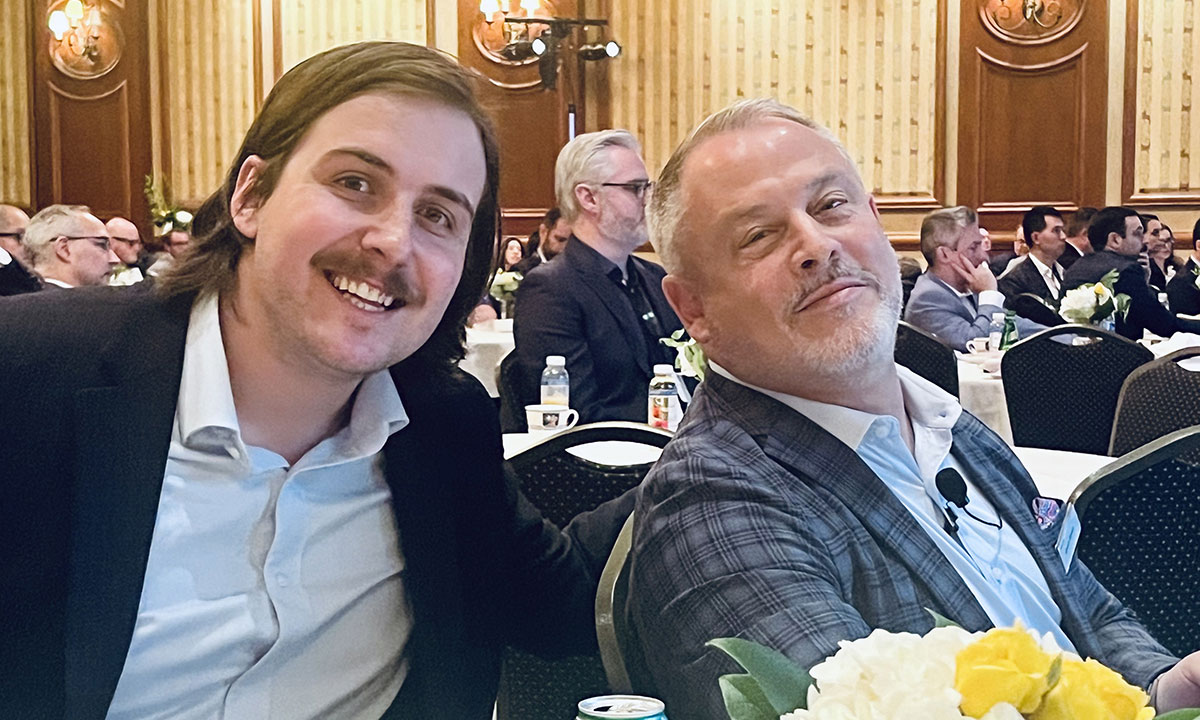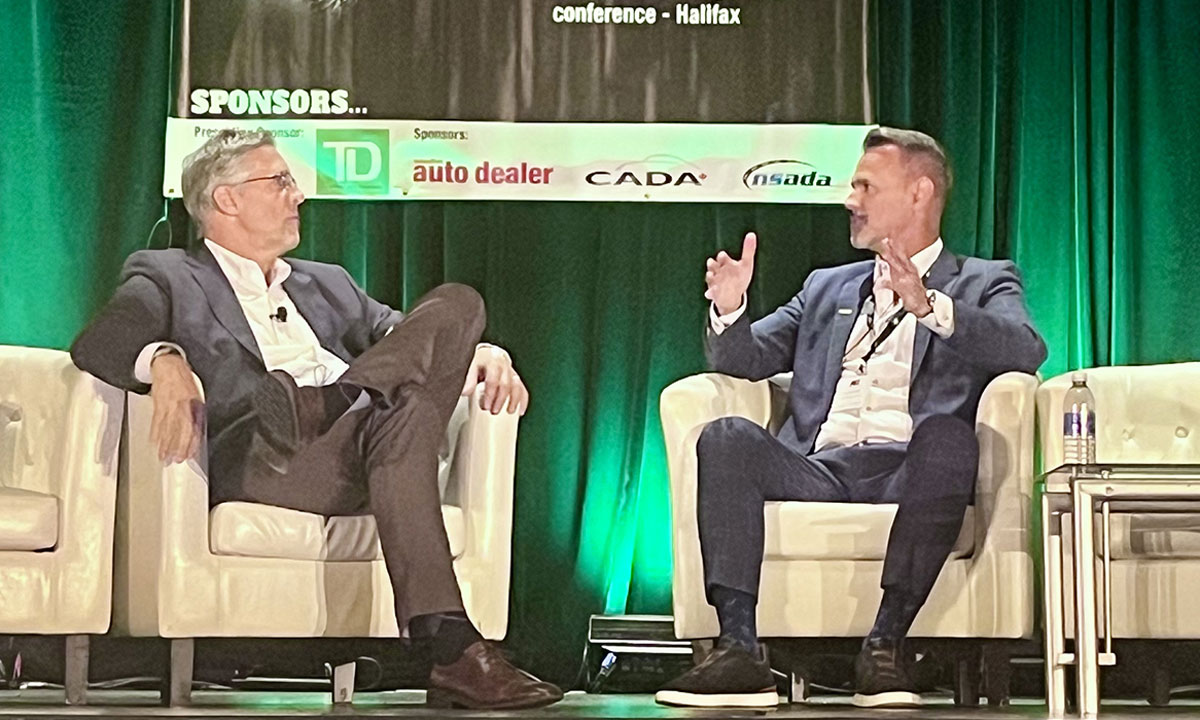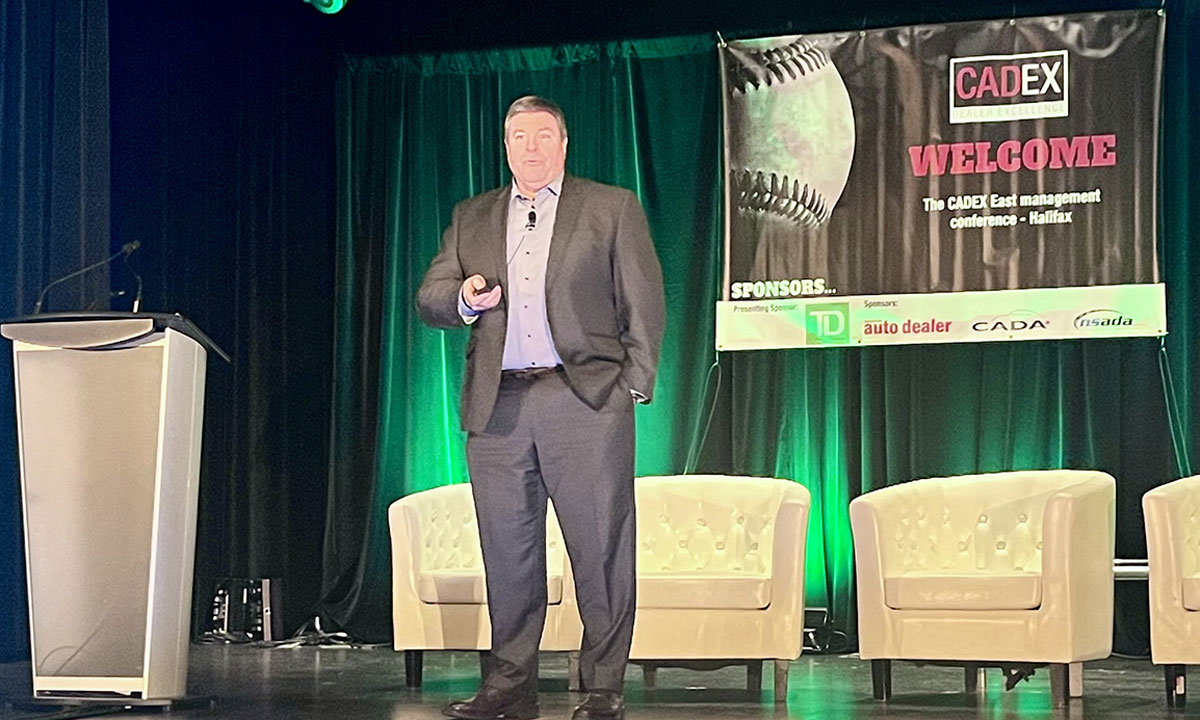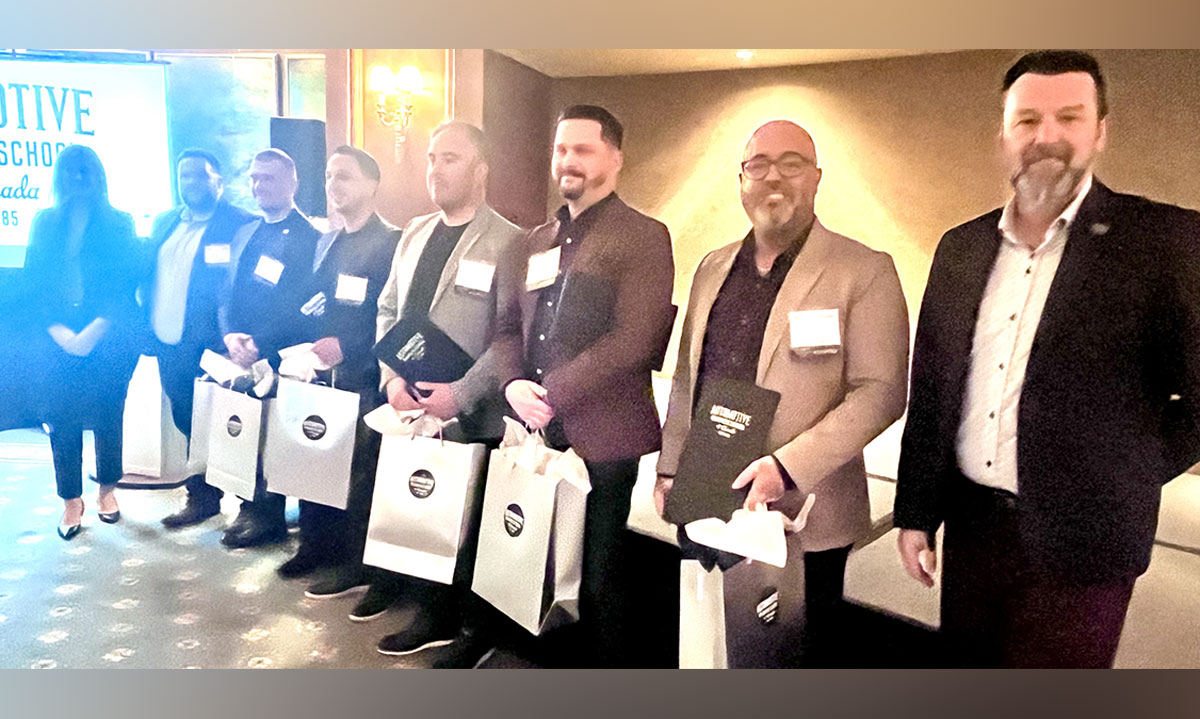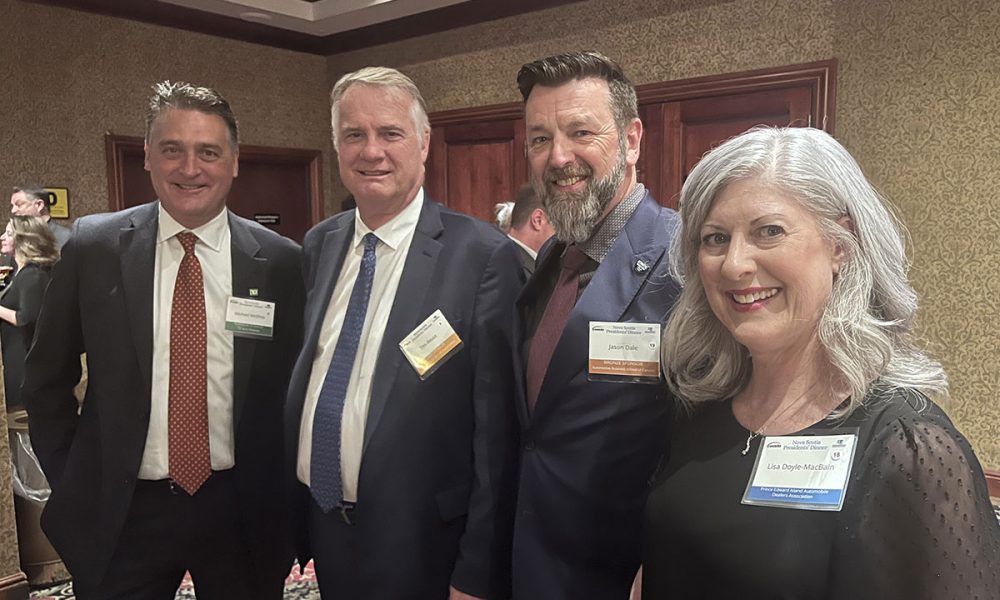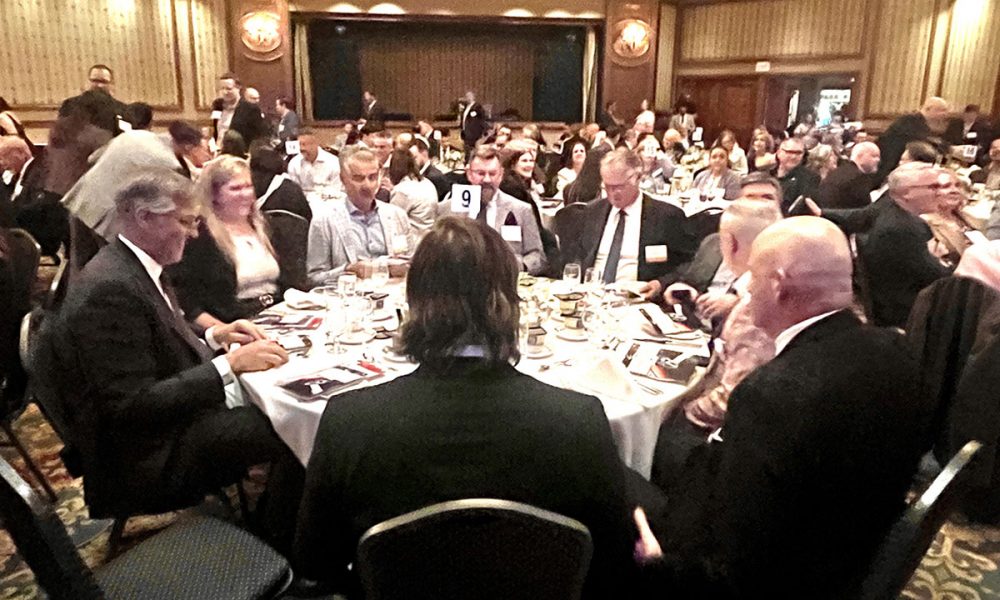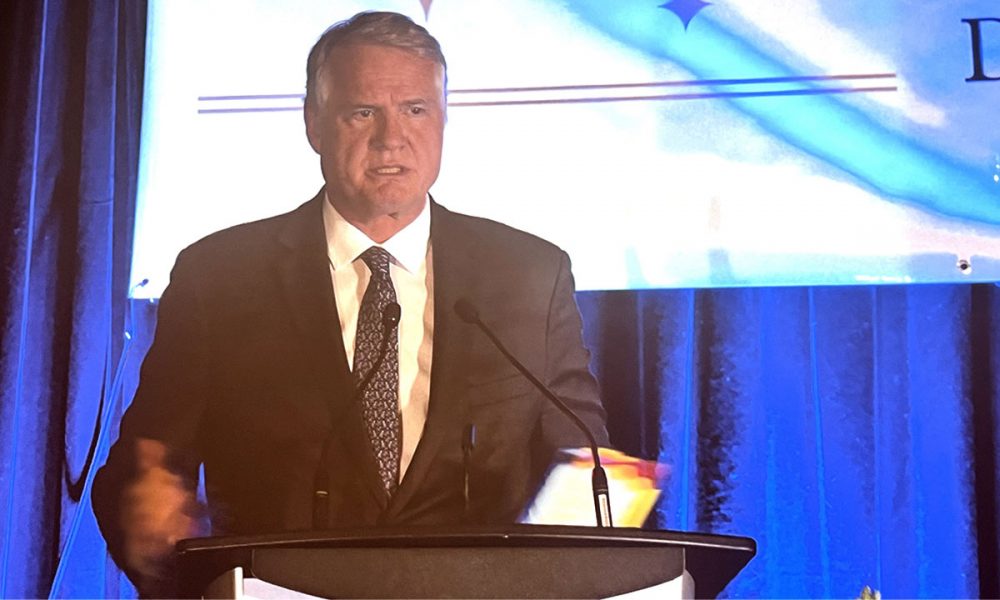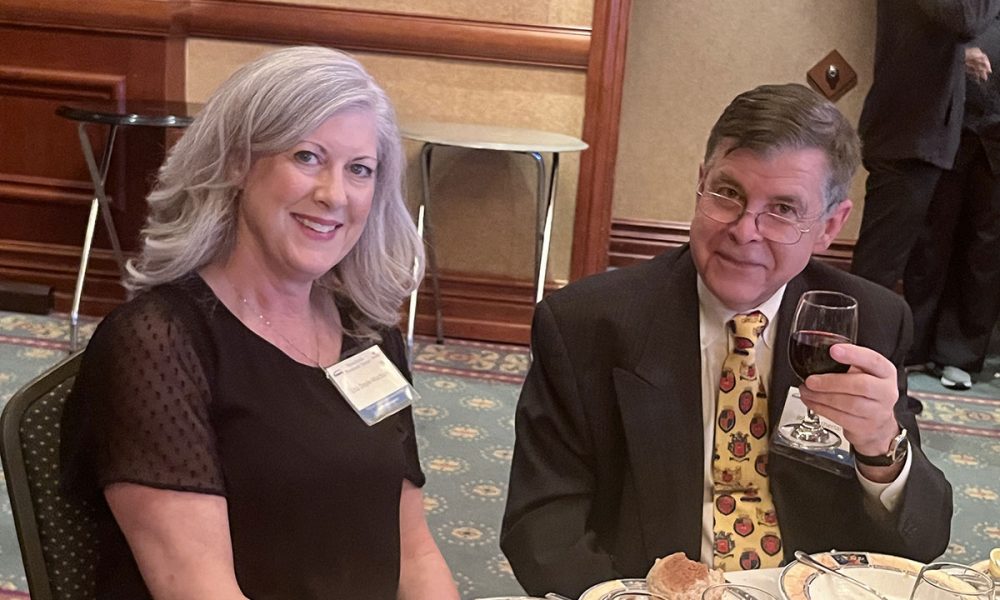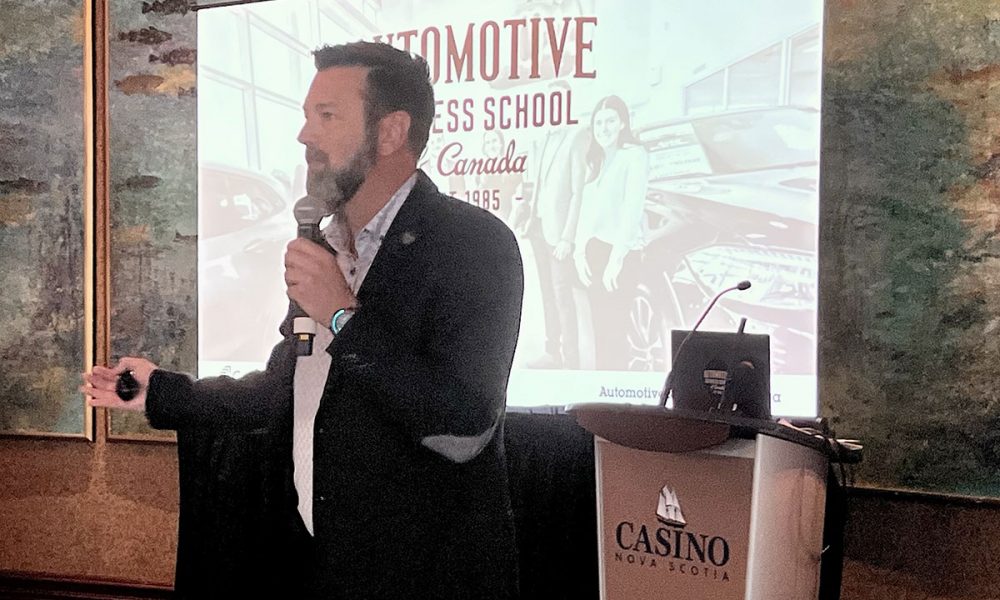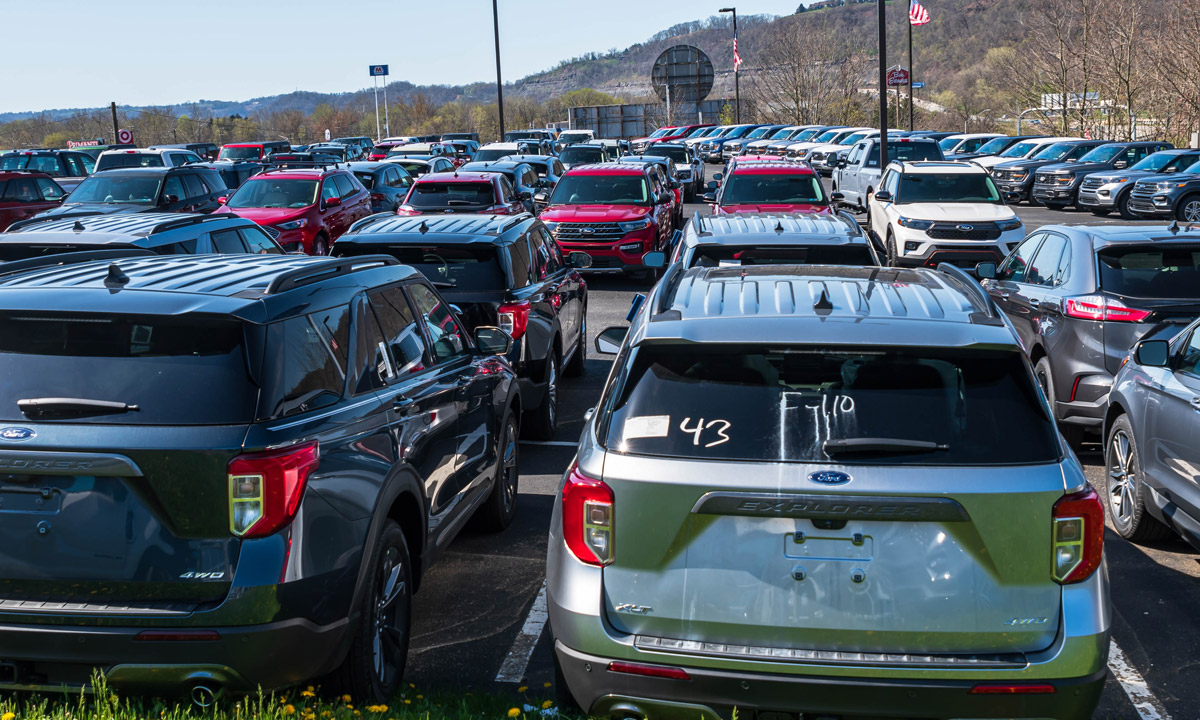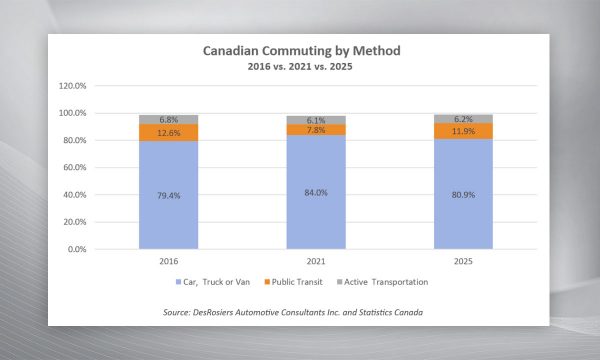It was a packed house for CADEX 2025.
In fact, the event has grown so much the organizers are having to find different locations to house the ever-growing dealer and supplier attendees.
“This year’s CADEX event had record attendance,” said John Sutherland, Executive Vice President of the Nova Scotia Automobile Dealers Association (NSADA), and the organizer of the annual event.
The event has become a staple in the Nova Scotia event calendar for dealers and has grown to include an alumni event featuring ABSC grads and industry supporters held on the eve of the event.
Conference Chair Kelly McCarron kicked off the day with a welcome and a nod to the event sponsor TD Auto Finance, who have sponsored the event for more than a dozen years.
Event emcee Niel Hiscox kicked off a day jammed with content with a cautionary tale that the period of uncertainty we are now living through will have a profound and permanent change on Canada’s economy and the auto industry. He likened it to the 1980s growing up in Montreal when the Parti Quebecois took power, which triggered a wave of businesses and people flooding out of the province into nearby Ontario. Quebec hasn’t been the same since.
But he ended the tale on a positive note, saying that through periods of transition there are also lots of new opportunities, including those for dealers. “I believe that we sit at a point of time in our history where we have an opportunity unlike we’ve ever had,” said Hiscox. “We have an opportunity to be a steadfast, reliable partner governed by the rule of law, that can be relied on to do business.”
Next up was Paul Williams, CADA Chair, who provided a recap of the whirlwind year he’d witnessed and how it had disrupted the dealer business.
The next session was a fast-paced run through all the issues CADA is tackling on behalf of dealers, led by CADA’s Lead Economist Charles Bernard and CADA’s Director of Public Affairs.
The duo took the stage and tag-teamed their way through the content, including a review of the recent federal election, which led to an unexpected return to power of the federal Liberals. “NDP voters were voting strategically because they didn’t want the Conservatives in power,” said Williams, explaining the Liberal surge in popularity.
Bernard said Pierre Poilievre’s “brash” style wasn’t popular in Quebec, and the collapse of the Bloc Quebecois in the province also helped spark the Liberal return to power. They provided an Ottawa insider’s view of what happened in the period leading up to the election and what has happened since. Williams said he expected the Conservative leader would remain at the helm despite the poor showing.
Williams said that CADA was active with their political lobby efforts in the period leading up to the election, including a high profile media event held on Parliament Hill to call on the next government to help boost the competitiveness of the auto industry. CADA’s five-point Automotive Competitiveness Framework received widespread media attention, and CADA showed examples of that coverage.
They also discussed the association’s advocacy work in other areas, including working with the media and the federal government to shine the light on an unprecedented surge in demand from Tesla for iZEV subsidies just prior to the program being suspended.
Williams said the association is also working to help educate groups like NADA and U.S. policymakers about the facts of the U.S. and Canada auto sector.
Bernard took a look at the economic forecast and impact of things like Trump tariffs and business uncertainty on growth and interest rates.
Colton LeBlanc, Nova Scotia’s first Minister of Growth and Development, Economic Housing and Acadian Affairs, gave a brief talk and passed along greetings from the Nova Scotia government and thanked the industry for its contribution to the province’s economy.
“You are pillars in your community,” said LeBlanc, adding that car dealers sponsor community events and hire Nova Scotians. “Buying a car is a statement of faith in your financial future.”
Next up was a session where emcee Niel Hiscox hosted a fireside chat with Jessica Todd, Director of Sales at Hyundai Canada.
Todd said the company had its best ever year, and had to adjust its model mix and plans for 2025, partly based on the changing demand for EVs. “We are hearing from our dealers about what they need and we are able to respond to that and get them that product,” she said, adding that 2025 was off to a strong start so far for the company.
“We are seeing a decline in EV sales right now largely fueled by the loss of rebates,” said Todd, adding that hybrid demand was growing, while ICE vehicles are still the company’s bread and butter.
Todd also talked about the changing consumer experience, the digital purchasing journey, and the company’s efforts to work with dealers to have a more seamless experience. She said the company has “zero intention” to bring the Amazon Hyundai shopping experience to Canada at this point as they are studying the U.S. learnings.
Todd said the company is well positioned to withstand the impact of tariffs by shifting where the company imports its vehicles from for its dealer network.
When asked about the possible arrival of Chinese OEMs, Todd said that’s out of the company’s control. “We can’t speculate about when another OEM will come to our market,” said Todd, adding that they will continue to build the brand in Canada and provide a top class customer experience in the event that other new competitors do arrive.
Todd said Hyundai has worked hard over the past decade to improve relations with their dealer network.
CADA’s Executive Director Industry Relations Bruce Rosen gave a detailed recap of the CADA China tour last month with a select group of 14 CADA dealers.
Rosen said the group met with trade officials, Chinese OEMs, toured highly-automated auto assembly plants by NIO and Volkswagen, talked with the head of a dealer group, and ended up touring Auto Shanghai 2025. “They are moving at the speed of sound. It’s amazing that things are moving so rapidly,” said Rosen.
Rosen said they viewed cars produced by smartphone companies Huawei and Xiaomi that have highly-advanced interfaces and connectivity.
Rosen said the Chinese OEMs are not just producing cheap and cheerful vehicles. “We were amazed at some of the cars we were looking at, the fit and finish and materials being used, and they are nice to look at,” he said.
Rosen said the industry is currently going through a lot of consolidation, as there are currently 80-100 Chinese OEMs. He said the Chinese OEMs are currently producing about 31 million vehicles and their domestic demand is only 20-25 million. The Chinese OEMs could now produce 40 per cent of the world’s vehicle production capacity. “These cars need to go somewhere, and they’d like to do it without adding any factories,” said Rosen.
Derek Sloan, President and CEO of SymTech, talked about F&I trends.
Sloan said that the F&I offices would also be impacted by broader industry changes brought about by tariffs. “You are probably going to see F&I products from OEMs and providers like us go up,” said Sloan, since costs would rise for things that are involved in any claims.
Sloan said that AI tools would also accelerate changes. “As you continue to go down that road, I would recommend you stay focused on your SEO efforts, and how AI gets involved.”
Sloan said one bit of advice was to look for the person in your organization who is interested in new technology and ideas and have them immerse themselves in learning about tools like generative AI so they can adapt these tools into your operations.
Sloan said he tried using AI, as an example, to try to buy a Chevy Tahoe in Halifax. He asked the AI platform to pick the best prices, best reviews, current offers, and the platform provided an organized chart with links to all the sources where he could purchase a Chevy Tahoe. Then Sloan asked AI how to protect the vehicle, and which protection products were available. Then it provided a list of protection products and the providers. “We have some work to do,” said Sloan. He said he doesn’t have to be an AI expert, he just needs to get AI experts.
He also said the focus for dealers selling F&I products has to be about selling the products that are relevant to the customers. If you want to provide a better customer experience, and want more opportunity, then you have to look at technology tools other than step-selling tools. “It’s inefficient, and doesn’t work well.”
Sloan also touched on the changing regulatory environment changes. “The regulatory environment in Canada is troublesome,” he said, and changes are being made without any input from car dealers.
He said distribution models are already changing. Car dealers will no longer be able to sell certain insurance products in B.C., Alberta and Quebec and the trend is moving across Canada. “This is why it’s important for us to work with the regulatory bodies to try to help them achieve what they are trying to achieve,” he said.
He said regardless of the distribution model that arises, consumers deserve the right to buy F&I products from dealers, and not just from an insurance company. “I think there are distribution models that we have implemented and technology plays a big part in that,” he said.
Laura Ferguson, Manager Consulting Expert at CGI and Dave Van Dorsten, Senior Cyber Security Analyst, provided a brief update to dealers about a new cybersecurity program available for NSADA dealers. They are running a pilot program and then will roll it out more broadly to all NSADA dealer members.
Van Dorsten said a lot of cyberattacks are phishing attempts — and they are getting better. Bad actors are now leveraging AI to improve their phishing emails. The email messages being sent to employees and customers are being tailored and personalized, with fewer grammatical mistakes so they are harder to identify.
He said their approach is based on a NIST cybersecurity framework with 106 controls, broken out into six categories: Identify, Govern, Protect, Detect, Respond and Recover.
Darren Slind, Co-Founder and President of the Clarify Group, presented the findings of Navigating the Road Ahead: Canada’s Automotive Evolution. “We do not have a crystal ball but we have been furiously polishing the ball that we do have, to see if we can see into the future,” said Slind.
Slind said the last time the report was produced was in 2019, and CADA intends to keep updating it to keep abreast of industry trends impacting the auto retail industry. He said CADA would release the report in June.
Slind went through several of the key study areas and said dealers know they will need to move from a transaction to a relationship with their customers. “Customers don’t want channel amnesia,” he said, adding they expect an omnichannel experience where their research efforts are captured and recognized. “Customers are looking for you, the dealers, to be their trusted advisors.”
Canada’s aging population is another key factor that will impact dealers in the next 10 years, he said, adding that there will be an additional 2.3 million Canadians in their senior years by 2035. The members of this group will be looking for things like age appropriate engagement, test drives from home, and valet service. Slind said the current affordability crisis will also intensify, and drive more people into the pre-owned part of their business.
He then called on dealers in the room to respond to the Canadian Automotive Retail Technology Study that CADA is launching this month. “We really need your help. Help us help you,” said Slind, urging dealers to have the right person in their organization complete the survey.
In terms of profitability drivers, Slind said dealers are concerned that new energy vehicles will impact profitability and they need to change their approach to their businesses. Dealers also felt that fixed operations are the number one future source of profitability.
“We think there is a once in a lifetime opportunity to lock up new energy vehicle owners,” said Slind. He said dealerships could help lock up the business and offer new services focused on convenience.
In one surprising finding, the survey found that 46 per cent of dealers said they expected to sell their business by 2035. In terms of the top three areas of concern for dealers, the top concern was workforce talent. “Fifty-seven per cent of all dealers in Canada cited it as the number one concern, but 62 per cent in the Atlantic provinces cited it as the top concern,” said Slind.
“The status quo is not an option, we are in the change business,” said Slind.
Slind offered some key takeaways for dealers.
- Leverage CRM: you need to know your customers and understand their preferences;
- Anticipate customer needs;
- Personalize the experience;
- Maximize convenience; and
- Support affordability.
The final session of the day was a dealer panel moderated by emcee Niel Hiscox.
Patrick O’Regan, dealer principal and the head of the O’Regan’s Automotive Group, was asked about some takeaways for dealers. He said he always sees dealers as retailers. Their job is not to engineer the vehicles — they simply sell and service other people’s engineering. So he said that it’s good news that one of the key drivers for industry success was all about workforce talent, because that is one area dealers can control.
“Process has been incredibly important for our company since its start,” said O’Regan. He said his father was a teacher and his uncle was an engineer, and the marriage between those two disciplines helped set a foundation for the company. “Making a game plan with process, intuition and empathy is very important,” said O’Regan.
Kelly McCarron, dealer principal, Thistle Hyundai said he appreciated the focus on people as a business differentiator. “It’s all about people. If you are going to be in a relationship business you have to have good people. We are struggling in our shops. What we have done successfully is hired and trained our own sales and service managers,” he said.
Marcel Pothier, dealer principal with Pothier Motors said he appreciated the presentation by Slind about the customer experience and the work dealers need to do to further develop the relationship with customers. “It’s been that way for a long time,” he said, particularly in small communities where he operates where your reputation means everything.
O’Regan said they know that when customers arrive at their dealerships they have already spent about 20 hours of research. So the sales process can start by discovering and acknowledging where they are on the journey, and then dealers can figure out how best to help them. “The one great scarcity all customers have is time.”
O’Regan cautioned that every time there’s a new tech or system involved dealers think they will suddenly get a retention opportunity, but if they don’t satisfy their employees and customers it won’t matter and they won’t keep their customers. That applies to the arrival of EVs, he said.
Andy Wadeson, VP of Sales for TD Auto Finance, gave a concluding message to conference attendees. TD Auto Finance is CADEX’s exclusive sponsor. “It is amazing to see where we’ve come from,” said Wadeson, saying he’s been involved in more than a dozen CADEX events.
On the eve of the CADEX event, the Automotive Business School of Canada held an alumni event, kicked off by a comedian sponsored by SiriusXM. The dinner brought alumni together with suppliers and industry partners.
Jason Dale, the ABSC’s Executive Director, provided a detailed overview of all the program’s activities in the previous year, including a high-profile exhibit at the Canadian International AutoShow that led to an immediate surge in applications for the program. The program, like many Canadian college programs, is struggling for attendance with the decline in immigration and international students.
At the end of the event, Dale called up the recent graduates from Nova Scotia from the Canadian Dealer Academy to get recognized.



